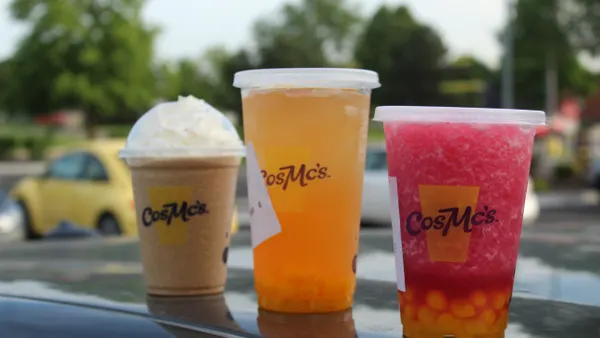Dive Brief:
- Impossible Foods is introducing a new formulation of its plant-based Impossible Burger, the company announced. The next-generation recipe has switched out textured wheat protein for soy protein concentrate, so the product has no gluten and also no animal hormones or antibiotics.
- The new formulation debuted Monday at the International Consumer Electronics Show in Las Vegas and at select restaurants. The retail launch is expected sometime later this year, Impossible Foods said. The company's chief communications officer, Rachel Konrad, told Food Navigator that its schedule is still on track despite the company having to get pre-market approval from the Food and Drug Administration because of its heme ingredient, which gives the uncooked product a red color.
- White Castle, which expanded its Impossible Slider to all 377 of its restaurants last fall, was the first fast food restaurant in Las Vegas to offer the revamped Impossible Burger, according to a company release. The chain will roll out the product chainwide throughout the next few months.
Dive Insight:
This new recipe marks the California-based startup's first major product upgrade since its original plant-based meat alternative debuted in 2016. The company said the reformulation comes after years of research, including third-party taste tests around the country with consumers who called themselves heavy meat eaters.
Tasters were given Impossible Burgers without buns or condiments, were not told whether it was plant- or animal-based and asked how well they liked it. They then did the same with ground beef patties from a major grocery chain. The company said that, based on aggregated data from more than 1,500 consumers in these sensory tests, the new product's "likeability" rating rivals that of conventional burgers.
Impossible Foods had several reasons for developing this new recipe, according to the company. The reformulated product is more adaptable and can be used in any dish that uses ground meat, while the original was "custom-designed for flat-top cooking at restaurants."
Also, the new version is made with soy protein instead of wheat protein, which caters to consumers who don't want to eat wheat or gluten. Additional recipe changes include reducing the salt content, replacing some coconut oil with sunflower oil and removing konjac gum and xanthan gum, Food Navigator reported. Such alterations are likely to appeal to consumers who increasingly look for foods free from certain ingredients — including antibiotics, pesticides and gluten.
"Impossible Burger fans told us loud and clear they wanted a gluten-free burger that was at least as nutritious as meat from animals,” David Lee, the company's chief operations officer and chief financial officer, said in a statement. "Our new product delivers all the taste meat lovers crave — without compromise to nutrition or the planet."
Regardless of ingredient lists, plant-based meat alternatives are continuing to win over consumers, whether they are vegans, vegetarians, or dedicated omnivores. Sales of plant-based foods jumped 20% in the past year to more than $3.3 billion, according to data from Nielsen and the Plant Based Foods Association. Plant-based meat alternatives totaled $670 million in sales — which was a 24% jump compared to 6% in 2017.
Unsurprisingly, restaurants across categories are responding to this growth by offering meat-free alternatives. Del Taco, for example, sells Beyond Meat's vegan meat crumbles and TGI Friday's made the Beyond Burger a permanent menu item last year. Umami Burger has also reported that its Impossible Burger makes up about 20% of its overall sales, and KFC is piloting meat-free "fried chicken" in the U.K. Given the cult following for the first iteration of the Impossible Burger, it seems likely that more chains will jockey for the revamped product as they seek to entice flexitarian eaters.













